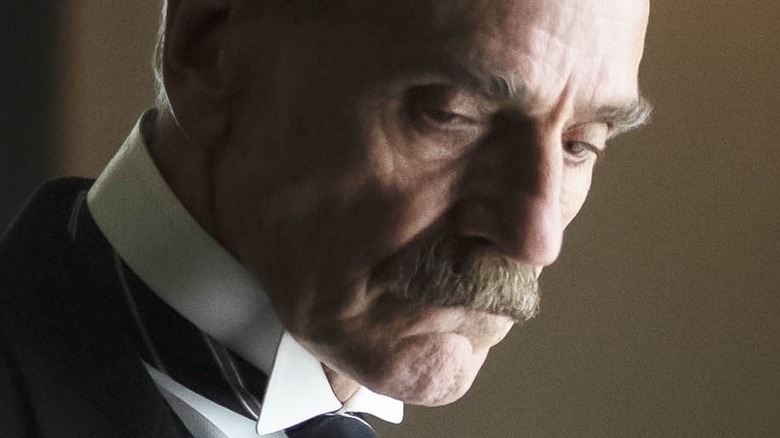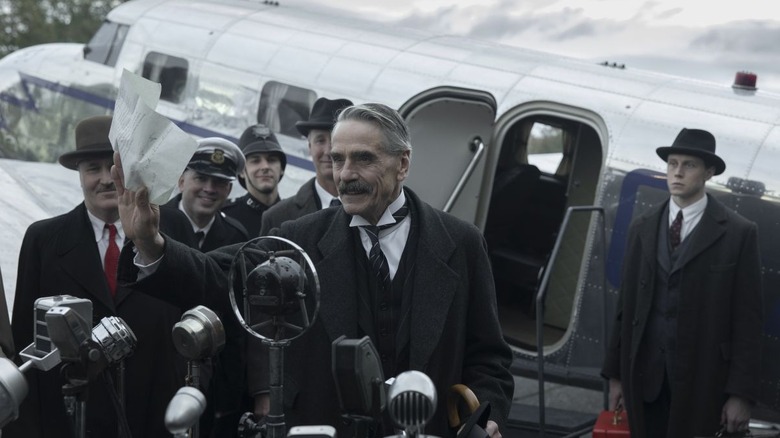Munich: The Edge Of War Review: Riveting Spy Thriller, Toothless Biopic
Outside the UK, Neville Chamberlain has been consigned to the footnotes of history. He was the last Prime Minister before Winston Churchill, leading the country through the first year of the second world war, only to resign in favor of a multi-party national government until peacetime resumed. He died in late 1940, and despite being generally popular during his time in power, is now looked back upon as the worst Prime Minister in British history — a narrative only reinforced by school history lessons, which document in significant detail the early allied failures during the war. Chamberlain wasn't entirely to blame, but his death did provide an easy scapegoat.
German director Christian Schwochow had never heard of Neville Chamberlain prior to making "Munich: The Edge of War," his adaptation of Robert Harris' spy thriller novel of the same name. Although functioning largely as a tale of two men on different sides of the conflict attempting to slow the slide into war, it's mostly captured attention (and in Britain, considerable controversy) for its attempts to partially rehabilitate Chamberlain's historical standing. Harris, a former BBC journalist who made a documentary about the Munich agreement in the 1980s, often highlights that Hitler detested Chamberlain for delaying his timetable of invading Europe by a whole year, even if the Prime Minister's attempts at appeasement look embarrassingly naive in hindsight.
A riveting spy thriller...
So while "Munich: The Edge of War" succeeds as an entertaining if overly familiar (pre-) WWII spy thriller, it stumbles on the aspect that has courted controversy. Even with a delightfully theatrical Jeremy Irons in the role, its portrayal of Chamberlain feels less than novel — every part the conventional depiction of a bumbling fool who couldn't see Hitler for who he really was, no matter the discussion about how it challenges the narrative put forward by the history books. But then again, rehabilitating the image of a man who failed to see the threat Hitler posed until tanks started rolling into Poland is a near impossible task few filmmakers could rise to. The suggestion that this film achieves otherwise feels like a deliberate attempt to get more eyeballs on this otherwise straightforward, but undeniably entertaining, espionage yarn.
Of course, Chamberlain isn't the central focus in a film that places a fictitious thriller plot at the sidelines of real events. This revolves around Hugh Legat (George MacKay), an Oxford graduate who works for Chamberlain's government and is brought over to Munich as the Prime Minister meets for talks with the Führer over his mooted attempts to invade Czechoslovakia. The year is 1938, and the threat of war is in the air — but all international leaders underestimate Hitler, not least Chamberlain, as they head for talks to ensure peace remains on the European continent. However, there's person who sees Hitler for the monster he is: Paul von Hartmann (Jannis Niewöhner), a former Oxford friend of Hugh's until the pair grew apart shortly after graduating in 1932, when Paul's support of the Nazi party understandably put a strain on their friendship.
Several years later, he's come to his senses. He's working in an administrative role for Hitler's government, but possesses documents highlighting his monstrous true intentions that he's working to get into foreign hands — which is where he begins to reconnect with his friend from university. "Munich: The Edge of War" is intriguing as a work of historical fiction precisely because we know how ill-fated the plots to halt Hitler in his tracks, both real and imagined, are. And while the film may aim to revise Chamberlain's standing to a certain extent, there's nothing here too ludicrous for historians to roll their eyes at; even as a looming plot to assassinate Hitler becomes increasingly central to the narrative, the film resists any cathartic urge to inch into Tarantino territory and fully rewrite history.
It's the rare work of historical revisionism whose changes are minor to the point of being unnoticeable, feeling so extensively researched in its period setting that the creative team seems uneasy playing too loose with the facts. Perhaps this is why the two fictitious characters are mostly kept at arm's length from the governments they're working for, operating mostly in the shadows to the bemusement of their leaders. To honor the truth, they have to work around it.
... But a toothless biopic
The film is at its best when focusing on this political espionage plot, even if this is where screenwriter Ben Power aims to make the parallels between the early years of Nazi Germany and the modern day almost too apparent. As played by George MacKay, Hugh Legat functions as an audience surrogate, the man in flashback scenes who acts as the only person disturbed by his German friend's adoration of Adolf Hitler, a man he sees clearly as an anti-semite and not the patriot he's proclaimed to be. Schwochow has said that he was drawn to the screenplay because of its relevancy in the post-Brexit, post-Donald Trump era, but the comparisons between time periods seem superficial — after all, this is a story about a failed resistance, and a political leader who isn't particularly inspiring because he doesn't fully comprehend the scale of evil he's dealing with.
While the film's overarching espionage story ensures this could never be mistaken for a political biopic (a "Darkest Hour" for Churchill's predecessor), you do get the sense that the creative team is treading lightly when it comes to exploring the central figure, feeling as toothless as other biopics about controversial political figures — namely that of later Conservative leader Margaret Thatcher, "The Iron Lady." It is neither a wholehearted redemption for one of British history's most belittled politicians, nor is it repeating the same stereotypical depiction of a man considered a fool, who let Hitler walk all over him. Instead, it exists somewhere in the middle, failing to challenge the official narrative without properly committing to him being a laughingstock. Irons' performance makes it easy to overlook this ideological uncertainty while watching — but with hindsight it only becomes more apparent just how unsatisfying a portrayal this is.
There are many surface level pleasures to "Munich: The Edge of War," the kind of spy thriller seemingly aimed exclusively at the grandparents who only got Netflix to watch "The Crown." But these espionage delights don't sit comfortably next to a more confused portrait of a controversial political figure that doesn't challenge our understanding of him in the way the filmmakers believe it does.


